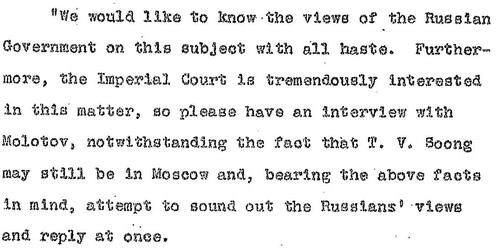
An excerpt from a July 12, 1945 US War Department summary of an intercepted cable from Japanese Foreign Minister Shigenori Togo to his ambassador to Russia
Posted on 08/06/2023 7:01:59 PM PDT by SeekAndFind
The anniversaries of the atomic bombings of Hiroshima and Nagasaki present an opportunity to demolish a cornerstone myth of American history — that those twin acts of mass civilian slaughter were necessary to bring about Japan’s surrender, and spare a half-million US soldiers who’d have otherwise died in a military conquest of the empire’s home islands.
Those who attack this mythology are often reflexively dismissed as unpatriotic, ill-informed or both. However, the most compelling witnesses against the conventional wisdom were patriots with a unique grasp on the state of affairs in August 1945 — America’s senior military leaders of World War II.
Let’s first hear what they had to say, and then examine key facts that led them to their little-publicized convictions:
General Dwight Eisenhower on learning of the planned bombings: “I had been conscious of a feeling of depression and voiced to [Secretary of War Stimson] my grave misgivings, first on the basis of my belief that Japan was already defeated and that dropping the bomb was completely unnecessary, and secondly because I thought that our country should avoid shocking world opinion by the use of a weapon whose employment was, I thought, no longer mandatory as a measure to save American lives. It was my belief that Japan was, at that very moment, seeking some way to surrender with a minimum loss of ‘face’.”
Admiral William Leahy, Truman's Chief of Staff: “The use of this barbarous weapon…was of no material assistance in our war against Japan. The Japanese were already defeated and ready to surrender because of the effective sea blockade and the successful bombing with conventional weapons.”
Major General Curtis LeMay, 21st Bomber Command: “The war would have been over in two weeks without the Russians entering and without the atomic bomb…The atomic bomb had nothing to do with the end of the war at all.”
General Hap Arnold, US Army Air Forces: “The Japanese position was hopeless even before the first atomic bomb fell, because the Japanese had lost control of their own air.” “It always appeared to us that, atomic bomb or no atomic bomb, the Japanese were already on the verge of collapse.”
Ralph Bird, Under Secretary of the Navy: “The Japanese were ready for peace, and they already had approached the Russians and the Swiss…In my opinion, the Japanese war was really won before we ever used the atom bomb.”
Brigadier General Carter Clarke, military intelligence officer who prepared summaries of intercepted cables for Truman: “When we didn’t need to do it, and we knew we didn’t need to do it…we used [Hiroshima and Nagasaki] as an experiment for two atomic bombs. Many other high-level military officers concurred.”
Fleet Admiral Chester Nimitz, Pacific Fleet commander: “The use of atomic bombs at Hiroshima and Nagasaki was of no material assistance in our war against Japan. The Japanese were already defeated and ready to surrender.”
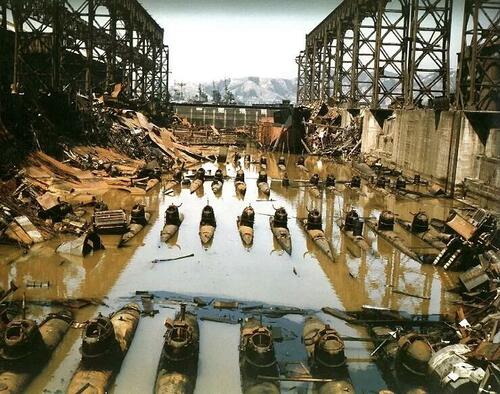
Putting out feelers through third-party diplomatic channels, the Japanese were seeking to end the war weeks before the atomic bombings on August 6 and 9, 1945. Japan’s navy and air forces were decimated, and its homeland subjected to a sea blockade and allied bombing carried out against little resistance.
The Americans knew of Japan’s intent to surrender, having intercepted a July 12 cable from Japanese Foreign Minister Shigenori Togo, informing Japanese ambassador to Russia Naotake Sato that “we are now secretly giving consideration to the termination of the war because of the pressing situation which confronts Japan both at home and abroad.”
Togo told Sato to “sound [Russian diplomat Vyacheslav Molotov] out on the extent to which it is possible to make use of Russia in ending the war.” Togo initially told Sato to obscure Japan’s interest in using Russia to end the war, but just hours later, he withdrew that instruction, saying it would be “suitable to make clear to the Russians our general attitude on ending the war”— to include Japan’s having “absolutely no idea of annexing or holding the territories which she occupied during the war.”
An excerpt from a July 12, 1945 US War Department summary of an intercepted cable from Japanese Foreign Minister Shigenori Togo to his ambassador to Russia
Japan’s central concern was the retention of its emperor, Hirohito, who was considered a demigod. Even knowing this — and with many US officials feeling the retention of the emperor could help Japanese society through its postwar transition —the Truman administration continued issuing demands for unconditional surrender, offering no assurance that the emperor would be spared humiliation or worse.
In a July 2 memorandum, Secretary of War Henry Stimson drafted a terms-of-surrender proclamation to be issued at the conclusion of that month’s Potsdam Conference. He advised Truman that, “if…we should add that we do not exclude a constitutional monarchy under her present dynasty, it would substantially add to the chances of acceptance.”
Truman and Secretary of State James Byrnes, however, continued rejecting recommendations to give assurances about the emperor. The final Potsdam Declaration, issued July 26, omitted Stimson’s recommended language, sternly declaring, “Following are our terms. We will not deviate from them.”
One of those terms could reasonably be interpreted as jeopardizing the emperor: “There must be eliminated for all time the authority and influence of those who have deceived and misled the people of Japan into embarking on world conquest.”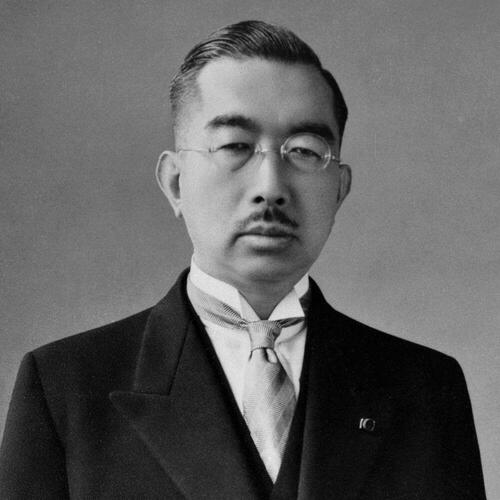
Japanese emperor Hirohito reigned from 1926 to 1989
At the same time the United States was preparing to deploy its formidable new weapons, the Soviet Union was moving armies from the European front to northeast Asia.
In May, Stalin told the US ambassador that Soviet forces should be positioned to attack the Japanese in Manchuria by August 8. In July, Truman predicted the impact of the Soviets opening a new front. In a diary entry made during the Potsdam Conference, he wrote that Stalin assured him “he’ll be in the Jap War on August 15th. Fini Japs when that comes about.”
Right on Stalin’s original schedule, the Soviet Union declared war on Japan two days after the August 6 bombing of Hiroshima. That same day — August 8 — Emperor Hirohito told the country’s civilian leaders that he still wanted to pursue a negotiated surrender that would preserve his reign.
On August 9, Soviet attacks commenced on three fronts. News of Stalin’s invasion of Manchuria prompted Hirohito to call a new meeting to discuss surrender — at 10 am, one hour before the strike on Nagasaki. The final surrender decision came on August 10.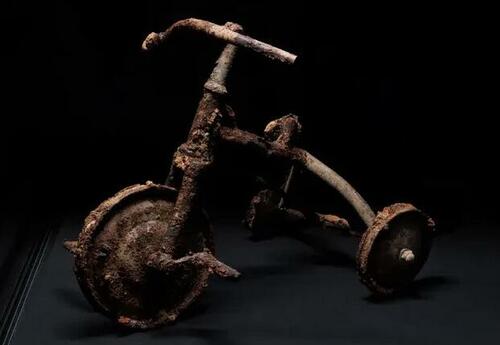
Three-year old Shinichi Tetsutani, burned as he was riding this tricycle when the atomic bomb hit Hiroshima, died a painful death that night (Hiroki Kobayashi/National Geographic)
The Soviet timeline makes the atomic bombings all the more troubling: One would think a US government that’s appropriately hesitant to incinerate and irradiate hundreds of thousands of civilians would want to first see how a Soviet declaration of war affected Japan’s calculus.
As it turns out, the Japanese surrender indeed appears to have been prompted by the Soviet entry into the war on Japan — not by the atomic bombs. “The Japanese leadership never had photo or video evidence of the atomic blast and considered the destruction of Hiroshima to be similar to the dozens of conventional strikes Japan had already suffered,” wrote Josiah Lippincott at The American Conservative.
Sadly, the evidence points to a US government determined to drop atomic bombs on Japanese cities as an end in itself, to such an extent that it not only ignored Japan’s interest in surrender, but worked to ensure that surrender was delayed until after upwards of 210,000 people — disproportionately women, children and elderly — were killed in the two cities.
Make no mistake: This was a deliberate targeting of civilian populations. Hiroshima and Nagasaki were chosen because they were pristine, and could thus fully showcase the bombs’ power. Hiroshima was home to a small military headquarters, but the fact that both cities had gone untouched by a strategic bombing campaign that began 14 months earlier certifies their military and industrial insignificance.
“The Japanese were ready to surrender and it wasn’t necessary to hit them with that awful thing,” Eisenhower would later say. “I hated to see our country be the first to use such a weapon.”
According to his pilot, General Douglas MacArthur, commander of US Army Forces Pacific, was “appalled and depressed by this Frankenstein monster.”
“When I asked General MacArthur about the decision to drop the bomb,” wrote journalist Norman Cousins, “I was surprised to learn he had not even been consulted…He saw no military justification for the dropping of the bomb. The war might have ended weeks earlier, he said, if the United States had agreed, as it later did anyway, to the retention of the institution of the emperor.”
What then, was the purpose of devastating Hiroshima and Nagasaki with atomic bombs?
A key insight comes from Manhattan Project physicist Leo Szilard. In 1945, Szilard organized a petition, signed by 70 Manhattan Project scientists, urging Truman not to use atomic bombs against Japan without first giving the country a chance to surrender, on terms that were made public.
In May 1945, Szilard met with Secretary of State Byrnes to urge atomic restraint. Byrnes wasn’t receptive to the plea. Szilard — the scientist who’d drafted the pivotal 1939 letter from Albert Einstein urging FDR to develop an atomic bomb — recounted:
"[Byrnes] was concerned about Russia's postwar behavior. Russian troops had moved into Hungary and Rumania, and Byrnes thought it would be very difficult to persuade Russia to withdraw her troops from these countries, that Russia might be more manageable if impressed by American military might, and that a demonstration of the bomb might impress Russia."
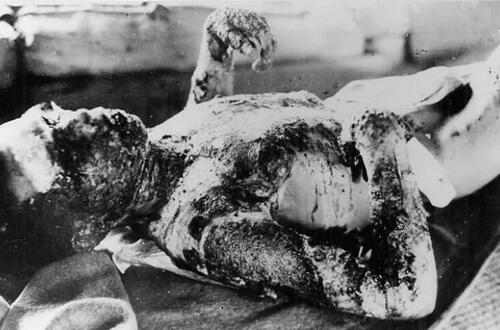
Whether the atomic bomb’s audience was in Tokyo or Moscow, some in the military establishment championed alternative ways to demonstrate its power.
Lewis Strauss, Special Assistant to the Navy Secretary, said he proposed “that the weapon should be demonstrated over… a large forest of cryptomeria trees not far from Tokyo. The cryptomeria tree is the Japanese version of our redwood… [It] would lay the trees out in windrows from the center of the explosion in all directions as though they were matchsticks, and, of course, set them afire in the center. It seemed to me that a demonstration of this sort would prove to the Japanese that we could destroy any of their cities at will.”
Strauss said Navy Secretary Forrestal “agreed wholeheartedly,” but Truman ultimately decided an optimal demonstration required burning hundreds of thousands of noncombatants and laying waste to their cities. The buck stops there.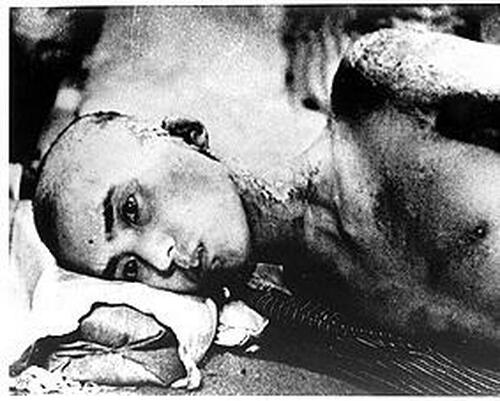
A victim of the atomic bomb
The particular means of inflicting these mass murders — a solitary object dropped from a plane at 31,000 feet — helps warp Americans’ evaluation of its morality. Using an analogy, historian Robert Raico cultivates ethical clarity:
“Suppose that, when we invaded Germany in early 1945, our leaders had believed that executing all the inhabitants of Aachen, or Trier, or some other Rhineland city would finally break the will of the Germans and lead them to surrender. In this way, the war might have ended quickly, saving the lives of many Allied soldiers. Would that then have justified shooting tens of thousands of German civilians, including women and children?”
The claim that dropping the atomic bombs saved a half-million American lives is more than just empty: Truman’s stubborn refusal to provide advance assurances about the retention of Japan’s emperor arguably cost American lives.
That’s true not only of a war against Japan that lasted longer than it needed to, but also of a Korean War precipitated by the US-invited Soviet invasion of Japanese-held territory in northeast Asia. More than 36,000 US service members died in the Korean War — among a staggering 2.5 million total military and civilian dead on both sides of the 38th Parallel.
We like to think of our system as one in which the supremacy of civilian leaders acts as a rational, moderating force on military decisions. The needless atomic bombing of Hiroshima and Nagasaki — against the wishes of World War II’s most revered military leaders — tells us otherwise.
Sadly, the destructive effects of the Hiroshima myth aren’t confined to Americans’ understanding of events in August 1945. “There are hints and notes of the Hiroshima myth that persist all through modern times,” State Department whistleblower and author Peter Van Buren said on The Scott Horton Show.
The Hiroshima myth fosters a depraved indifference to civilian casualties associated with US actions abroad, whether it’s women and children slaughtered in a drone strike in Afghanistan, hundreds of thousands dead in an unwarranted invasion of Iraq, or a baby who dies for lack of imported medicine in US-sanctioned Iran.
Ultimately, to embrace the Hiroshima myth is to embrace a truly sinister principle: That, in the correct circumstances, it’s right for governments to intentionally harm innocent civilians. Whether the harm is inflicted by bombs or sanctions, it’s a philosophy that mirrors the morality of al Qaeda.
That’s not the only thread connecting 1945 to 2023, as Truman’s insistence on unconditional surrender is echoed by the Biden administration’s utter disinterest in pursuing a negotiated peace in Ukraine.
Today, confronting an adversary with 6,000 nuclear warheads — each a thousand times more powerful than the bombs dropped on Japan — Biden’s own stubborn perpetuation of war puts us all at risk of sharing the fate of Hiroshima and Nagasaki’s innocents.
This article is bullsh!t. The invasion of the main Japanese island would have been horribly brutal to both sides.
It is telling that, out of those 45 goals, these are the first three of them:
There is a reason that this revisionist crap has been around almost from the moment those bombs finished exploding, and these three reasons shed some light on that, IMO.
My Dad, the most wonderful man and my hero, (later an eye surgeon and father to me and six siblings) was a young Ensign in 1945, in charge of 4 LCVPs, on a small Destroyer Escort conversion to a landing support ship, APD. He was working up in the Atlantic for the invasion of Japan, while the European troops were repositioning back to invade Japan. They were told to expect, in a main invasion of main islands of Japan to expect 80 % casualties, almost a MILLION US alone, and over a million more Japanese. Battle hardened marines, my Dad said, from Europe joining his group wept when the bombs ended the war.
Is the relief of guilt from the communists and enemies of our country by wringing their hands over the destruction of those two cities, which were a fraction of the Japanese and American casualties from the nukes...why are we even listening to these idiots?
Who gives them any authority? How about the families, like me who would not have been born, where is my say in the collective guilt I must now support for what??? The end of a war??? I want to punch someone.
General Anthony C. McAuliffe wholeheartedly agrees, saying: "Nuts!"
Richard B. Frank’s “DOWNFALL: The End of the Imperial Japanese Empire” concludes the same. The Japanese were most concerned with their home islands, and as word spread of nuclear attacks on Hiroshima and Nagasaki, and probability of more cities being heavily damaged or destroyed by American nuclear attack, panic and complete societal breakdown was inevitable. That is why Japan surrendered.
We should make reparations to ourselves by dropping one on D.C.. America would enter a new golden age.
Correction;
“.Is the relief of guilt from the communists and enemies of our country by wringing their hands over the destruction of those two cities, which were a fraction of the Japanese and American casualties from the POTENTIAL INVASION INSTEAD...why are we even listening to these idiots?
As General William Tecumseh Sherman said: “War is all hell.” Sherman basically said that you have to take the war to the people who are supporting and supplying the enemy, and you have to make war so horrible that they lose their will to fight.
I think your post hits closer to the truth than much of what we hear about this.
I referenced that in my post, that the bombs changed everything in a military perspective.
Since the people who uttered those quotes were largely honorable men, it isn’t easy to consider this aspect, but a lot of warfighters didn’t like the idea that someone pushing a button might take the place of men fighting things out as they always had, albeit with different weapons every time.
In 1945, there wasn’t yet Korea, Vietnam, Desert Storm, Operation Iraqi Freedom, etc.
They might well have thought in 1945 that the bomb made them obsolete.
LeMay??? OMG. The author of “massive retaliation” against the Soviet Union if they invaded Europe after the war????
I don’t believe it either...
And Hirohito was never tried for war crimes, although there were plenty that the Japanese committed in his name, especially the way they treated the military POW's.
Every American parent who did not lose a son in an invasion of Japan, every American alive today because one of their grandfathers did not have to participate in an invasion of Japan, begs to differ.
The Japanese had demonstrated that they would fight fanatically and generally fought until annihilated.The US had suffered huge casualties invading Iwo Jima and Okinawa. The Japanese army still had considerable strength within Japan proper. There is no hard evidence that Japan was willing to unconditionally surrender. The atomic bomb offered American leaders the option to annihilate Japan without suffering huge additional casualties. Most veterans idolized Truman for dropping those bombs which made a costly invasion of Japan proper unnecessary.
There were certainly some needless things that happened in WWII. Oh, like the sneak attack on Pearl Harbor, the Rape of Nanking, the Bataan death march to name a few.
“I simply do not believe these quotes. LeMay? And Hap Arnold? No way.”
General Anthony C. McAuliffe wholeheartedly agrees, saying: “Nuts!”
The left has resorted to whole cloth lies. The democrats buy it with no problem, which IS the problem...
You’re attempting a circular argument. If you believe the quotes are true, prove it. It’s impossible to prove a negative. You know that.
For reference I will point you to some of the finest recent scholarship on the subject:
“The Fleet at Flood Tide” by James Hornfischer
“Twilight of the Gods” by Ian Toll
“Downfall” by Richard Frank
These works annihilate this revisionist drivel into oblivion.
Cherry picked evidence to support a position. I doubt this is true.
What do Freepers have to say about the matter?
(C'mon man.)
Sadly, there's probably not too many left to share their personal memories. Guess we'd have to look for books, diaries, letters. I'm sure there are plenty of diaries and letters in manuscript collections throughout the country. Would be a thrill to track them down, but at 76, I no longer have the energy, or money to pursue research projects like I did in my younger days. One of the most enjoyable times of my life was going to places like the National Archives, Library of Congress, college libraries and historical societies, and getting to go through a box that included letters, a diary, and photos from the Civil War. Would have loved to have been a professional researcher, but like being an Archaeologist, it doesn't pay squat.
Me too
Disclaimer: Opinions posted on Free Republic are those of the individual posters and do not necessarily represent the opinion of Free Republic or its management. All materials posted herein are protected by copyright law and the exemption for fair use of copyrighted works.